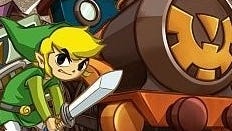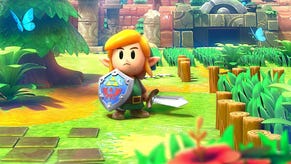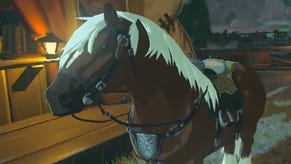The Legend of Zelda: Spirit Tracks
Toot sweet.
It would be easy to use the railroad theme of this latest DS Zelda as a metaphor for how precisely formulaic Nintendo's adventures have become: shuttling their young hero along pre-ordained paths from one faithfully-observed tradition to the next, keeping to a strict timetable, unfolding like an engineering schematic as much as a fairytale. There'd be some truth to it, too. Never in the series' self-referential history has one instalment followed the structure and style of its predecessor so closely (and seldom so quickly) as Spirit Tracks does those of 2007's Phantom Hourglass.
But if you were to interpret Spirit Tracks' train as a sign of weary creative emptiness, you'd be dead wrong. It's the heart and soul of a delightful, irrepressible game. The train's urgent puffing sets the brisk rhythm and breezy tone, and jumping into it inspires the simple, stirring excitement of setting out on a journey that Zelda games have always done so well. Being a train driver is a childish fantasy for sure, but that's just it - it's evoked with such infectious joy as to keep this ageing series (not to mention its players) young at heart.
It helps that hero Link is reborn each time as a wide-eyed pup in a brand new land that just happens to have a Princess Zelda and a Hyrule Castle - although in Spirit Tracks, there are a few veiled references suggesting that it's set in the same world as Phantom Hourglass, a couple of generations down the road. That's as close as any Zelda game gets to admitting it's a sequel. This Link is off to see this Zelda so she can officially induct him as a train engineer, a heroic job in a society that revolves around magical train tracks that, the tales say, are chains created by the spirits to bind a great demon in his underground prison.
Needless to say, there's a plot to release the demon, the tracks start disappearing, the Princess is kidnapped, and Link somehow ends up with a sword and shield in his hands and a green sock on his head, travelling the world and unpicking the mechanical mysteries of a series of dungeons in order to restore the Spirit Tracks and save the Princess. Or rather, to save the Princess' body - it's been taken as a vessel for the demon, but her spirit has been left behind. So Zelda accompanies Link on his whole adventure for the first time, if only as a ghost.

In practical terms, that's no major departure. For most of the game, she serves much the same role as a Navi or a Midna, a voice in your ear who giggles, nags, hints, comments and lays out your options. Sometimes, however, Zelda takes your side for real - more on that in a second - and her impact on the tone of the game is something else again.
Link's usually a lonely hero and Zelda a distant ideal, but in Spirit Tracks they're inseparable, engaged in an adorable, innocent childhood romance straight out of a Hayao Miyazaki film. It's eloquently spelled out in the exchanged looks and gestures of the animation and in the simple zest of the script (even though Link, as ever, doesn't say a word). They even high-five at one point, one of many moments in which the game's youthful exuberance runs away with it (you respond to questions with "Yep" or "NO WAY!"; one character actually says "Woot!"), but it's so charming it always pulls it off. It's a long way from the melancholy lyricism of Ocarina of Time or Twilight Princess; Spirit Tracks must be the happiest, most heart-warming Zelda to date.






